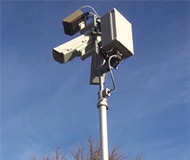1/17/2018
France Introduces Crosswalk Ticketing CamerasFrench government introduces cameras that mail tickets to vehicle owners accused of failing to stop for pedestrians.

France is dramatically expanding the scope of its automated ticketing with the announcement last week that cameras would mail tickets to cars photographed passing pedestrians in a crosswalk. The new technology is part of a broader effort by the government of Emmanuel Macron to crack down on motorists.
"It is our duty to take these measures," Prime Minister Edouard Philippe said in a speech at the Hotel Matignon in Paris announcing the policy. "Whenever a government has had the courage to commit, the results have been spectacular. In a way, it is easier for this government than it has been for a number of governments that preceded us, because we know that when strong measures are taken, they have results."
The pedestrian cameras are designed to mail tickets to the owner of any vehicle that fails to stop for a person who "shows an intention" to cross a roadway. The system was developed by AFS2R, a photo ticketing company. It uses one set of cameras to track the movements of pedestrians while another uses automated license plate recognition (ALPR, also known as ANPR) to record the vehicle and identify its owner. If the video appears to show the vehicle failing to yield to a pedestrian, the owner will be mailed a 135 euro (US $165) fine and four points will be imposed against his license.
Philippe cited the increase in traffic fatalities on French roads between 2015 and 2017 as a reason to boost the number of photo citations. In 2018, the budget forecasts one billion euros (US $1.2 billion) in revenue will be collected by adding an additional one hundred speed cameras, bringing the nationwide total to 4700. Beginning July 1, the speed limits on many French roads will be reduced.
"This is why we have decided to lower the maximum authorized speed from 90 to 80 km/h [56 MPH to 50 MPH]," Philippe said. "I also want to tell you that this decision is unrelated to any financial motivation."
The extra cash raised by lowering the speed limit would be transferred to the government's health care budget.
"This fund will be endowed with the entire surplus of revenues collected by the state, linked to the lowering of maximum speeds," Philippe explained.


